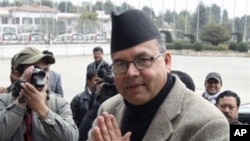Nepal has elected a new prime minister, following a seven month political stalemate. The new leadership is expected to revive Nepal's languishing peace process.
Jhalanath Khanal was elected as prime minister on Thursday evening by lawmakers following a last minute decision by the Maoist party’s candidate, Prachanda, to withdraw from the race.
It was the 17th time that parliament met to choose a new leader after the resignation of the previous prime minister last June. Since then, Nepal has been in a political vacuum due to the inability of its fractious political parties to decide on a leader.
Jhalanath Khanal belongs to the UML, United Marxist-Leninist, party, which is allied to the Maoists. The Maoists are the largest party in a divided parliament.
Yuvraj Ghimire, a political analyst in Kathmandu, says the new prime minister faces many challenges.
Ghimire says Nepal’s new leader will have to restore better governance and speed up the task of drafting a new constitution for the country.
"After all it is a hung parliament and there is just four months left for the new constitution to be delivered to the country. In addition, the country’s economic situation, law and order situation, and general sense of security is very, very bad," Ghimire said.
Prime Minister Khanal, whose UML party is the third largest in parliament, has appealed for the support of all political parties. He says the country can only make the transition to peace and prosperity on the basis of national consensus.
Political analysts say the new Prime Minister will have to work out a common agenda with both the Maoists and the opposition Congress party.
The task will not be easy in a country where the peace process has been stalled by deep differences between the country’s political parties. The peace process began in 2006, when Maoist guerrillas ended a decade-long civil war. But the parties disagree both on the shape of the new constitution and on the future of about 19,000 former Maoist fighters who are living in camps.
The new prime minister has warned lawmakers that they must consolidate the progress made since the civil war ended or once again be plunged into crisis.




